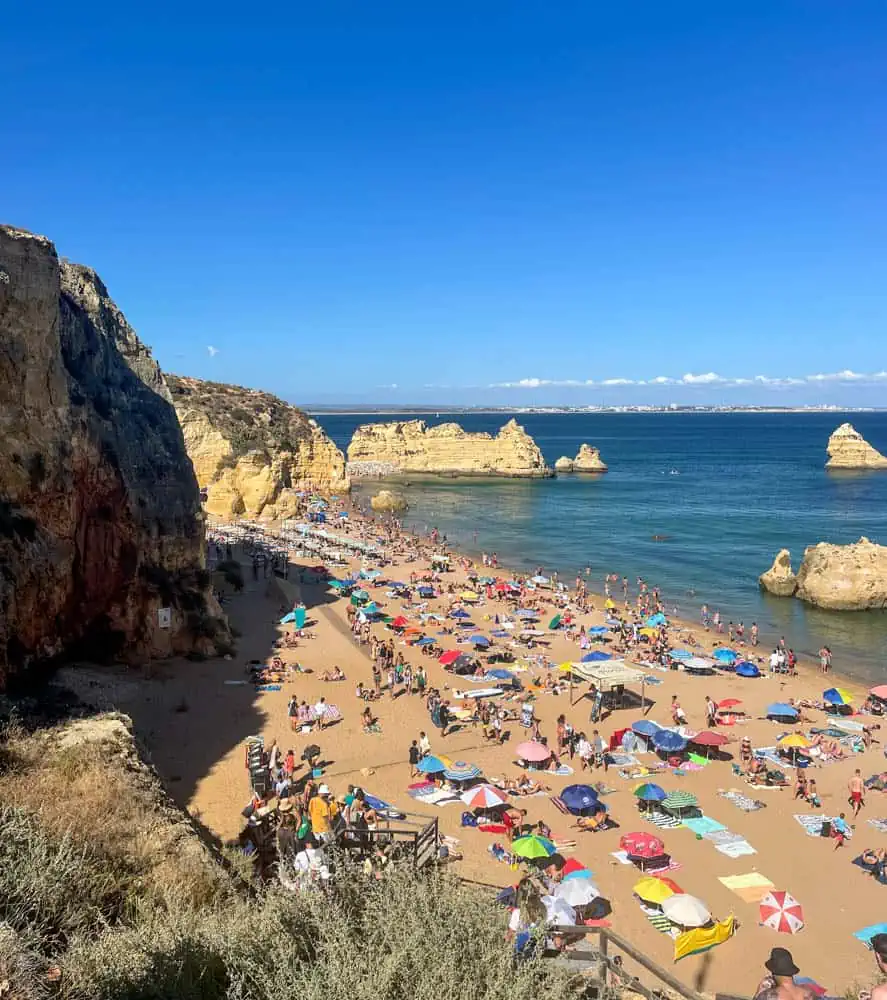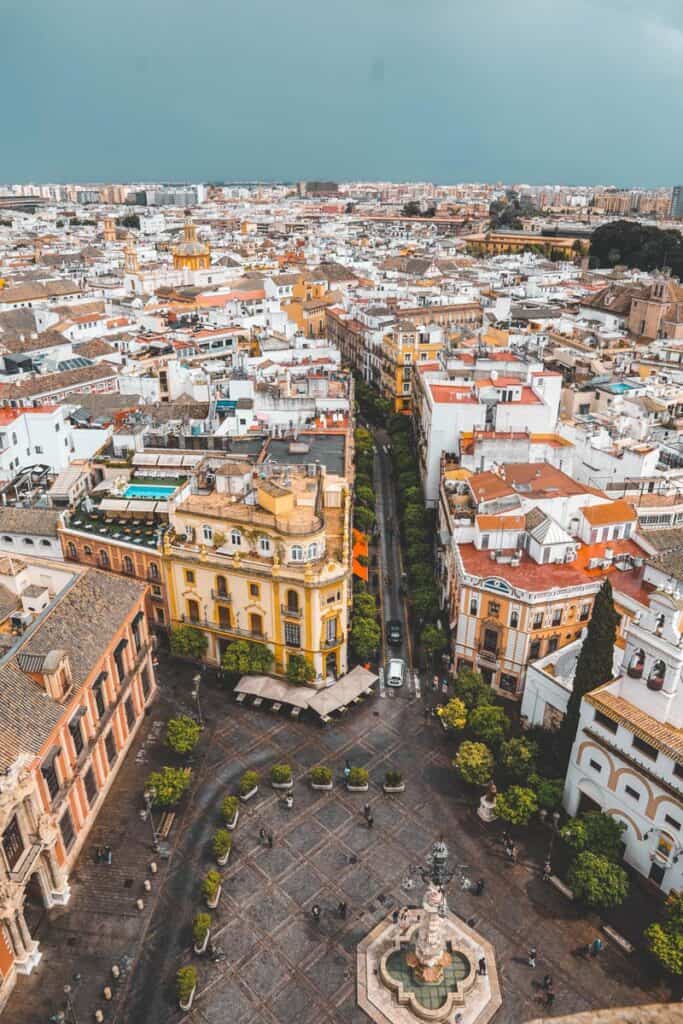This post may contain affiliate links. By clicking and making a purchase through the links, I earn a small commission at no extra cost to you. See my disclaimer for more information. This and display ads allow me to keep the site up to date and give back.
When considering your next European nomad destination, looking for a mild temperature with a low cost of living, the Iberian Peninsula might come to mind. But deciding on living in Portugal vs Spain might rise some questions.
I’ve lived in both, and am going to break down the differences to help you decide which country is best for you!
Both countries have similar cultures, weather conditions, beautiful beaches, charming small villages, and vibrant big cities with endless coffee shops and coworking spaces to work from.
There are a lot of things to take into consideration, and in this post, I will go through the most important things for digital nomads so that you can make a sound decision.

Living in Portugal vs Spain
Cost of living in Portugal vs Spain
One of the first things you might find interesting to look at when deciding if living in Portugal or Spain is best for you is the cost of living. Compared to the rest of Europe, both countries offer a lower cost of living than other western European countries.
However, Portugal is slightly cheaper, which reflects the average salary being lower than in Spain. Looking at rental prices in Lisbon vs Madrid, they both average 1000 Euros for a one-bedroom in the city center.
That said, you can get cheaper rent and lower cost of living in Portuguese cities like Évora and Braga while you mostly have to look for small towns in Spain to reach the same prices.
Generally, eating out, going to the cinema, and other leisurely activities are slightly lower in Portugal, and it is estimated that you can live well with 50-80 Euros less in Portugal compared to Spain.
While this definitely can save you some money in the long run, it is not a huge difference altogether.
Compared to the United States, Spain and Portugal are about 45% cheaper to live in, so no matter where you choose to live, there will be a significant difference if you come from the United States or Canada.
Still, cost of living might be one of the reasons many digital nomads favor Portugal over Spain. Especially over recent years, Lisbon has turned into a hot spot for digital nomads and expats.

Weather
While there is a similar climate in Portugal and Spain, there are some differences that might affect your preferences for where to move.
First of all, Spain is a huge country compared to Portugal, and there are a lot more differences in temperatures from one place to another with skiing destinations, high altitude mountains, and places with beach weather all year round, it is hard to set an average temperature on the country that will reflect what you will actually encounter when you get there.

Portugal on the other hand is a small country with the south and north being slightly different, especially in the winter months.
First, let us compare the southern parts of each country, the Algarve in Portugal and Andalucia in Spain. They both boast long summers with temperatures of 30-40 degrees celsius, 320 yearly days of sun, and mild winters averaging 10-12 degrees raising to 18-20 degrees celsius in the daytime.
The biggest difference is that the biggest coastal expat communities in southern Spain are in Malaga and Costa del Sol on the Mediterranean. The whole coast of Portugal belongs to the Atlantic Ocean, which means that there is a lot more wind and it might feel a lot colder in winter.
The central and northern cities that are the most popular destinations with expats and digital nomads like Lisbon, Porto, Madrid, and Barcelona have a fairly similar climate.
If you are looking for even warmer climates, the Canary Islands might be just for you. I spent two months living in Tenerife, which is a major hub for digital nomads.
Nonetheless, both the Portuguese and the Spanish spend a lot of time outdoors all year round, and you will find a high quality of life in both countries.

Visas and entry requirements
As a Canadian/American, you are only allowed to stay in Portugal and Spain for 90 days within a 180-day period on a regular tourist visa, as they are both part of the Schengen zone. But if you are an EU resident – consider yourself lucky as you don’t need to worry about this.
Both Spain and Portugal require a visa for non-EU (or Schengen) residents to move there past the 90 dys. The most popular visa program is the Golden Visa Program which is offered by both countries. However, it requires a large financial investment, and Portugal just announced they are ending it.
The visa gives you the opportunity to live, study, and work in the country, and travel to other EU countries, and it makes your immediate family eligible for residency.
The main difference is the time it normally takes for the visa application to process. Spain usually gives you an answer within 90 days, while for the Portuguese process, you might have to wait as long as 12-18 months.
It is also slightly easier to obtain the Spanish Golden Visa, as you might get it granted even though you have previously been refused entry to the EU and Schengen area, while Portugal will deny you the visa in that case.

Last year, Portugal launched a digital nomad visa and Spain was not far behind with offering it in January 2023. The good thing is that you now have another great option to stay and live in either of the countries.
You need to show proof of income of a minimum of 2820 Euros for the Portuguese visa while it is 2000 Euros for the Spanish.
Finally, if you wish to apply for Portuguese citizenship, you can do so after 5 years of residency, while in Spain you must wait for 10 years, and the process is more complicated.

Taxes
The taxation is also different, with a tax of 20% in Portugal for the first 10 years for non-habitual residents and Spain’s tax regime offers a reduced taxation of 15% for the first 4 years and after that, it is 25%.
This makes Spain more lucrative if you do not plan to spend more than 4 years in the country, but if you are there for the long run, Portugal has a stable 20% for tax residents staying up to 10 years.
Culture
The culture in Spain and Portugal has its similarities, but there are also differences that will make the living experience quite different.
The Spanish culture is famous for the “mañana mañana” (tomorrow tomorrow) which you to a large extent can notice in their laid-back lifestyle. Yet at the same time, the Spanish are generally outgoing, loud, and fast-paced people in comparison to the Portuguese.
But this also differs within Spain, where you notice that the south is more laid-back than the north, especially in the cities.

The Portuguese people, on the other hand, can be perceived as slightly more reserved, thus it can feel like life is more slow-paced in Portugal. In my experience, though, both nationalities are extremely friendly!
Besides being laid-back, both countries are very family-oriented and patriotic, yet in different ways. In Spain, you will mostly notice that people are proud of their city, town, or region, while in Portugal, they are proud to be Portuguese and their colonial past.
Also eating hours are slightly different, where the Portuguese have both lunch and dinner earlier than the Spanish. The Portuguese also do not close shops and offices at midday for the “siesta” while in Spain, most offices and local shops do close for 1.5-2.5 hours during the middle of the day. This does not apply to big supermarkets and international stores.

Food and drinks
Both Portugal and Spain boast an amazing food scene, though it is mostly seafood and meat-heavy.
Spain is famous for its tapas, which are small-size dishes that come in every possible type of food.
With this, I would say that the Spanish dining-out culture is stronger than in Portugal, where you mostly get full-sized meals. The Spanish people love to go out and share a few tapas over some drinks with friends on any day of the week.
Generally, though, Portugal has more fresh seafood and has a reputation for its delightful fish and seafood dishes.
If you are looking for vegetarian or vegan food, it is getting easier and easier in the big cities and touristy areas in both countries as more and more vegan joints pop up.
That said, it is worth noting that a number of Spanish tapas are “accidentally” vegetarian or vegan, so you do not have to miss out on the traditional dishes.
You can also find delightful vegan Pastel de Nata in the big cities and many touristy towns in Portugal, which is their national dessert and a must-try.

While restaurant prices average a little bit higher in Spain, you can get tapas for a low cost and in some regions, you get a free tapas when you order a drink, which basically gives you a free meal if you order 3 drinks.
When it comes to drinks, Spain is famous for a number of local beers and their bubbly cava. They also produce some local wine. Portugal is famed for its port wine and Vinho Verde. It really just depends on what you prefer.
Language
When it comes to languages, Spain and Portugal come out quite different. In Portugal, everyone speaks Portuguese, with a slight difference in dialects throughout the country. Note that the Portuguese language they speak in Portugal is different from Brazilian Portuguese.
In Spain, on the other hand, there are several languages depending on the region. Castellano is the “official” Spanish language that is spoken in most of the country.
However, you will hear a lot of different dialects, especially in the Andalucia region, where they are said to speak very difficult-to-understand Spanish, mainly because they have a whole lot of slang words that you will not hear anywhere else in the country, and they often just pronounce parts of the words.
But there are also different languages like Castilian, Basque, Galician, and Catalan, which are completely different from Spanish. Because some of these regions want to be independent of Spain, you might encounter difficulties communicating in Spanish. Even though most know it, they do not use it.
So it really depends on where you plan on moving to in Spain which language they speak. While moving to Portugal, you will only have to worry about one language. Note that in tourist areas, you can normally get by with English in both countries, but in lesser touristy areas, fewer people know English.
Places to visit and sites to see

When you move to a new country, you probably want to explore all the different tourist sites like cities, towns, and maybe even natural wonders.
Frankly, both countries have a lot to offer when it comes to this, but Spain is a bigger country and there are obviously more places to explore.
It is one of the countries in the world with the most UNESCO sites and holds a well-preserved physical heritage from the Moorish times, while most of these sites in Portugal were strongly damaged by the 1755 earthquake in Lisbon.
If you are a hiking enthusiast, Spain has a lot more variety in places to hike with 3000-meter peaks, deserts, lush green forests with waterfalls, and coastal walks. But there is nothing wrong with the Portuguese nature scene either. Especially if you head to the islands of the Azores, which are described as heaven on earth.

Finally, you are only a short border crossing away from the other country no matter which one you choose to live in, and you have a fantastic opportunity to explore both countries.
As they are both in the EU, you can drive across the border without any controls (except for random controls that might occur.)
Safety
Both Portugal and Spain are considered safe countries to live in, and crime rates are low. That said, you can expect regular non-violent crimes like someone breaking into your car, pickpocketing, or bag snatching.
These are all things you can prevent to a certain degree by not leaving valuables visible in your car, holding on to your bag in busy areas, and making sure you keep your valuables in safe places. Basically the same precautions you should take anywhere.
According to the Global Pace Index of 2022, Portugal is number 6 of the safest countries, while Spain is ranked number 29. That said, it is not much difference you will notice when you live in the countries. There is also a factor that Spain is a lot bigger than Portugal, with a lot more major cities, which is mostly where the crimes fold out.

Final thoughts on living in Spain vs Portugal
After looking at the differences between living in Portugal vs Spain, there are a lot of similarities, and which country is the best, is truly up to your preferences.
Portugal ends up being slightly cheaper than Spain and generally has better tax options for expats (unless you look at staying up to 4 years, then Spain has a great offer for digital nomads).
In the long run, Portugal is better for those who plan to stay there and eventually want to become a resident.
When it comes to the culture, language, and food scene, they both are great, so which is the best country depends on your liking. In my experience, I prefer Portugal over Spain – but I know many nomads who feel the opposite!
The great part about being a digital nomad is that you can try living in Spain and Portugal and decide which one you prefer more!

